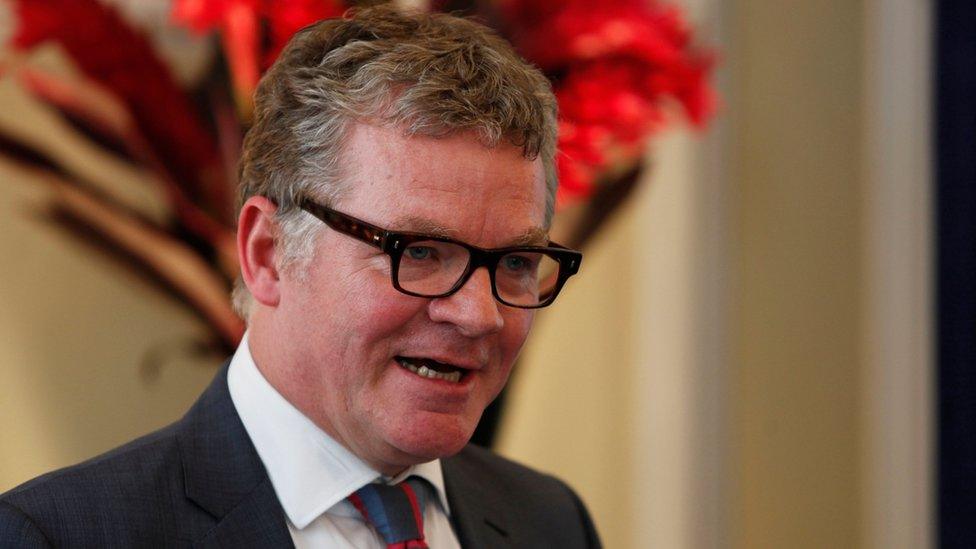School catch-up tsar resigns over lack of funding
- Published

Sir Kevan Collins said the funding for school recovery "does not come close" to what was needed
The education recovery commissioner for England, Sir Kevan Collins, has resigned in a row over the lack of "credible" Covid catch-up funding.
Sir Kevan took on the role as catch-up tsar in February to develop a long-term plan to help pupils make up for lost learning during the pandemic.
But on Wednesday he stepped down saying the government's funding for the plan "falls far short of what is needed".
Head teachers labelled the £1.4bn cash over three years as a "damp squib".
The Education Policy Institute had calculated that a catch-up funding recovery would need £13.5bn - and Sir Kevan was reported as having put forward plans costing £15bn.
The government's proposal represents £50 per pupil per year - and Sir Kevan wrote to the prime minister saying: "I do not believe it is credible that a successful recovery can be achieved with a programme of support of this size."
A Downing Street spokesman said: "The prime minister is hugely grateful to Sir Kevan for his work in helping pupils catch up and recover from the effects of the pandemic.
"The government will continue to focus on education recovery and making sure no child is left behind with their learning, with over £3bn committed for catch up so far."
Earlier on Wednesday, the government announced an extra £1.4bn over three years for education recovery, in addition to the £1.7bn already announced.
This included £1bn for 100 million hours of tutoring, aimed at disadvantaged pupils, and £250m for teacher training and development.
The resignation statement from Sir Kevan, reported by The TES, external, said: "A half-hearted approach risks failing hundreds of thousands of pupils.
"The support announced by government so far does not come close to meeting the scale of the challenge and is why I have no option but to resign from my post."
His resignation letter to Boris Johnson said: "When we met last week, I told you that I do not believe it will be possible to deliver a successful recovery without significantly greater support than the government has to date indicated it intends to provide."
PM Boris Johnson says there will be more funding coming "down the track"


This was a chaotic end to what should have been a showcase of the catch-up plan for England's schools.
The widely-respected adviser brought in to deliver the plans walked out in protest - turning a story that should have been about extra money into an awkward debate about the lack of it.
The resignation letter from Sir Kevan Collins to the prime minister makes plain that this should not have come as a surprise.
"When we met last week, I told you that I do not believe it will be possible to deliver a successful recovery without significantly greater support," wrote Sir Kevan.
Boris Johnson and Education Secretary Gavin Williamson had spent the day trying to keep the plans afloat, presenting them as a "next step" with more to follow - after strong criticism that the funding was only a tenth of what was required.
But Sir Kevan's resignation has fired a torpedo at the government's contention that school recovery is one of its top priorities.

Earlier, head teachers had said they were "hugely disappointed" by the announcement after expectations of a much bigger set of proposals.
Paul Whiteman, leader of the National Association of Head Teachers, described it as a "damp squib" and said "education recovery cannot be done on the cheap".
As such, he said: "It is completely understandable that Sir Kevan chose not to become a pawn in whatever game the government is playing."
Mr Johnson then reassured schools and parents that more funding would be "coming down the track".
Sir Kevan had been responsible for overseeing efforts to help schools in England recover from the disruption of the pandemic and lockdowns, which has seen pupils studying from home and exams cancelled over two academic years.
He had reportedly called for funding for 100 extra hours of teaching per pupil - including for sports, music and the arts.
But any extra teaching time, or longer school days, will now depend on getting further funding from the spending review.
In a statement, Sir Kevan said a "sustained and comprehensive programme of support" would be needed and that "more will be needed to meet the scale of the challenge".
'Sad but not surprised'
Geoff Barton, head of the Association of School and College Leaders, said: "We are sad but not surprised that Sir Kevan Collins is standing down.
"We know that Sir Kevan had much bolder and broader plans but that these required substantially more investment than the government was willing to provide.
"He's tried his hardest on behalf of children and young people, but, in the final analysis, the political will just wasn't there to support him."
Labour's shadow education secretary Kate Green said the resignation was a "damning indictment of the Conservatives' education catch-up plan".
"He was brought in by Boris Johnson because of his experience and expertise in education, but the government have thrown out his ideas as soon as it came to stumping up the money needed to deliver them."
Before taking up his post as tsar, Sir Kevan was head of the Education Endowment Foundation (EEF), which examines evidence for what works in education.
As EEF chief executive, he ran an organisation that examined ideas for raising achievement, with the aim of breaking the link between deprivation and poor outcomes in school.
Sir Kevan has had a long career in education, as a former teacher who went on to be the director of children's services and chief executive of Tower Hamlets, east London.